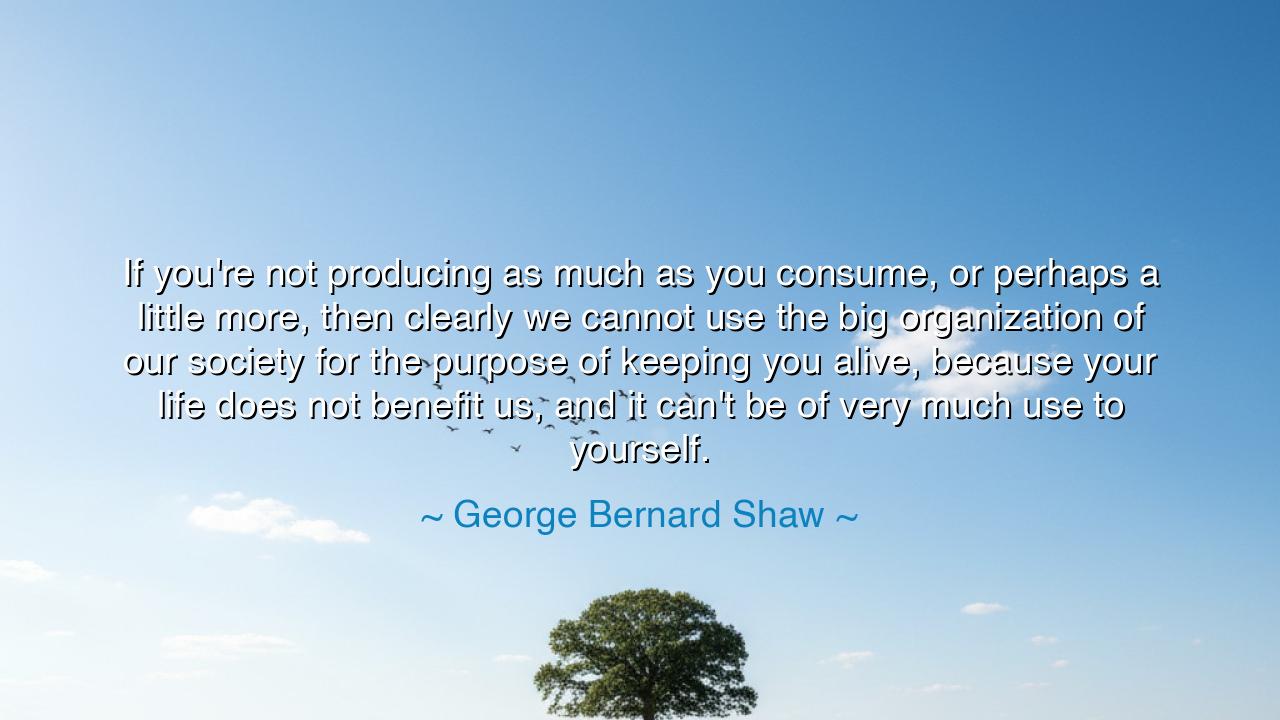
If you're not producing as much as you consume, or perhaps a
If you're not producing as much as you consume, or perhaps a little more, then clearly we cannot use the big organization of our society for the purpose of keeping you alive, because your life does not benefit us, and it can't be of very much use to yourself.






Hear now the austere words of George Bernard Shaw, who dared to pierce the veil of sentiment with the sharp blade of reason: “If you’re not producing as much as you consume, or perhaps a little more, then clearly we cannot use the big organization of our society for the purpose of keeping you alive, because your life does not benefit us, and it can’t be of very much use to yourself.” These words are fierce, unsettling, and deliberately provocative. Shaw, master of paradox and social critique, sought not to praise cruelty, but to awaken minds to the stern balance between individual responsibility and collective survival.
The meaning is both practical and moral. Society is a great organism, a body in which each member must play a part. To consume without producing is to draw from the common store without replenishing it, to weaken the whole by demanding what one does not return. Shaw speaks here with the severity of an ancient lawgiver, declaring that life itself gains worth only when it contributes, when it gives back more than it takes. To live without giving is to drift into futility, to fall short of the dignity of existence.
The ancients knew this truth well. In Sparta, every citizen was trained from youth to serve the polis, to be soldier or mother of soldiers, to labor not for self alone but for the strength of all. To fail in this duty was to dishonor one’s name. In Rome, too, citizenship was bound to contribution: taxes, military service, or labor for the state. Those who shirked their role were despised as parasites, for the greatness of Rome was built on the idea that the individual must return to the commonwealth what he draws from it. Thus Shaw’s words echo the voice of antiquity: life without contribution is life without honor.
Consider the Great Depression of the 1930s. Millions found themselves without work, unable to produce, yet still compelled to consume for survival. The crisis exposed a tension: should society cast aside those who could not contribute, as Shaw’s harsh words suggest? Or should it sustain them until they could rise again? The answer that emerged in programs like Roosevelt’s New Deal was a compromise: assistance was given, but tied to work, public projects, and rebuilding. Even in crisis, the ideal remained that human dignity is restored not through idleness, but through contribution, however humble.
Shaw’s words, shocking in their bluntness, force us to ask: what is the worth of a life that gives nothing? He does not deny the value of compassion, but he warns against mistaking endless consumption for true living. To merely survive, drawing endlessly from others, is not to flourish. Life without production—whether of goods, of ideas, of love, of service—is a dim shadow of what life is meant to be. True fulfillment comes when one’s existence benefits both self and society, when one’s days are marked not by what was taken, but by what was given.
Yet we must temper Shaw’s iron with mercy. There are times when a person cannot produce—the child, the sick, the elderly. Here lies the measure of a humane society: to support those who cannot contribute until they are able, or in gratitude for contributions already made. The error lies not in offering aid, but in allowing dependency to become a permanent state, stripping both individual and community of strength. Shaw’s words, though severe, remind us that life gains its nobility through effort, not indulgence.
The lesson for us is clear: seek always to give more than you take. Do not be content to exist as a consumer only, feeding on the labor of others. Ask yourself daily: what am I producing? What value, what service, what creation do I offer in return for the bread I eat and the breath I draw? Teach your children that the measure of a worthy life is not wealth, but contribution; not ease, but usefulness. For a society where all produce, even in small ways, is a society that rises; but a society where many consume without giving is one chained to decay.
Thus remember: to live is to contribute, to consume without producing is to drift toward emptiness. George Bernard Shaw’s words are not only a rebuke but a challenge: rise above dependence, embrace the dignity of labor and creation, and make your life a force that lifts both yourself and the world. For only then can the great machine of society truly serve its purpose—not to carry idlers, but to magnify the strength and worth of all who live within it.






AAdministratorAdministrator
Welcome, honored guests. Please leave a comment, we will respond soon